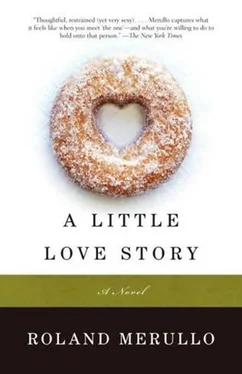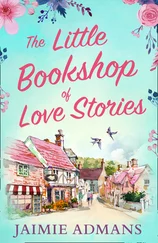Janet had drifted away from me. I saw her standing in front of an unofficial plaque that showed the names of the dead. The flags there were fluttering loudly in the wind. I stared past her, down the slope, to the fenced-in area near the line of the woods. One of the things I’d read-when I had started to let myself read about that day-said that, at the very end of the ordeal, the plane’s engines were no longer functioning and it had been coasting along in silence, upside down, as it came over the houses near Shanksville. I had thought about that many times.
Many times, times beyond counting, I had imagined Giselle’s fear, and the feelings of the rest of the people in that plane, and in those other planes, and in those buildings. Every sane soul in the world, it seemed to me, had imagined that.
Janet walked over to another memorial someone had made, with small photographs of the passengers glued onto it, their names and ages. Hours and hours some person had spent doing that. I did not want to see it. I could feel myself starting to cry. Not cry, exactly. I could feel myself starting to weep. So I walked past the chain-link billboard, past a sheriffs car, over a second small rise, and I stood there where no one could see me, with my back to the filled-in strip mine. I put my hands in the pockets of my jeans and I let my head droop down so that a steady salty stream worked into the corners of my mouth and onto my T-shirt, and though I tried to be very quiet, I could not. I walked a little farther away, over another stony rise, and I stayed there a long time, weeping until it was all out of me, and then I wiped my face with the bottom of my T-shirt and looked up into a perfectly empty sky and breathed and breathed.
It seemed to me then that the whole problem with the way the world was designed came from the fact that we lived in separate packages. You could not ever really reach out of your miniature world and into someone else’s and feel what they were feeling. Not really. Not enough. Maybe making love, or maybe during short flashes of conversation with a friend, or maybe, maybe, for a few hours after the world had witnessed something horrifying. Gerard had said to me that when your children were young you could do that. And when my mother had talked to me about her parents’ deaths-which had been slow, hard deaths-she’d said there came a point when you felt something like that. All the dying person’s protection had been burned away, she told me; it seemed as if they opened themselves up to you, cut themselves open and allowed you in.
I breathed and breathed, wiped my face. After a long time, when I was more or less calm again, I turned and walked back toward my truck. From the top of the second rise, I could see, over the white roof of the sheriff’s SUV, that Janet had put down the tailgate of my pickup and was sitting there in her summer dress, dangling her legs over, watching for me. I looked away. Another few steps and I looked back and when I was up close to her she put a hand on my shoulder, leaned forward, and licked the salt from my face.
THE TRUTH IS that Janet and I did not talk about Shanksville on the first part of the long ride home. The silence was uncomfortable. At the same time, there was a way in which we were at peace with that discomfort. The distance between us felt like an honest distance, unthreatening.
I could not help thinking that, with Giselle, if things had happened differently, we would have talked and talked, about the memorial, about America, about former lovers and families, and God and pain and death and mysteries. We would have filled the cab of the truck with words because that was the territory we had gone to in order to try to escape the loneliness we felt with each other, the vague, nagging, secret disappointment. If she had not been on that particular plane on that particular day, if we had been able to work out the trouble between us, then Giselle and I would have grown old together sitting on a porch somewhere, reading aloud to each other from sections of the Sunday newspaper, waiting for the grandchildren to call.
The road away from Shanksville lifted and dipped, curling along high slopes over wide red and gold valleys, with sparking rivers slicing through them, and the long rich hills rising on either side like blanket-covered bodies sleeping at some distance to one another. Janet and I listened to one CD-Derek and the Dominos, made before either of us was born-then just rode quietly. She had started coughing again, intermittently. The sound of it stabbed at me like a dull blade.
We stopped for lunch, and for a gas fill-up for the old machine, and afterwards Janet asked if she could drive for a while and I said, “Of course.” She was an intent, careful driver, speed limit minus five. I closed my eyes and moved in and out of a half-sleep infested with smoky dreams.
Somewhere in eastern Pennsylvania she pulled over. We switched places, but still didn’t say much. Darkness fell when we were in New York State, on 684. The highway was a necklace of white and red lights looping toward home.
In Connecticut she said, “I went to prep school near here. My mother thought it would be good for me to go away after my father died. We argued about it. I wanted to stay with her and I was really private about taking medicines and so on. The last thing on earth I wanted was to have a roommate watching me use the inhalers and the vest and so on. She’s sweet, my Ma-you’ll see when you meet her-but she has this drill-sergeant/kung-fu master side that comes out when she’s worried about me. So I applied, got a scholarship, ended up with a bulimic genius roommate and some great friends. Senior year I had a boyfriend named Alonzo. From this fabulously wealthy family in Venezuela. He invited me to go home with him for Christmas, and my mother said I could go-his family was paying-but I didn’t want to.”
“Were you sick?”
“Not that sick then, no. I just wanted to be home at Christmas. I knew my mother was having a hard time and trying to pretend otherwise for my sake, and I wanted to be around her. Anyway, Alonzo and I used to go out for walks in the woods near the campus and just kiss and hold hands. We never did make love. The summer after graduation we wrote a lot of letters. And then every year I was in college he’d write to me in November and ask if I wanted to come to Caracas for the Christmas holidays. I always said no. Senior year, for some reason or another, I went. I was really starting to feel not so good by then, maybe that’s why. Maybe I was starting to understand that no one would ever marry me, and I knew that Alonzo had always had a special thing for me. Plus, a friend of mine I’d been in the hospital with a few times had already died… Anyway, I went. It was about like you’d expect: the family lived in a twenty-room house with servants and they were very gracious with me and we had a feast on Christmas Eve and went to church the next day and had another feast after church. I had my inhaler and my pills and my vest, and I was feeling okay, but I could see it made Alonzo uncomfortable, you know, how much sicker I’d gotten since high school, the progression of things, the medications. I think, since then, I’ve always been sensitive about that, on dates especially. One of the things I liked about you in Diem Bo was that you didn’t seem bothered.
“Anyway, they were a very kind family. I went horseback riding with his sisters. I’d never been on a horse. The next day Alonzo and I drove to a beach house they had near a place called Puerto La Cruz, which was a beautiful little city with pastel houses and a stony beach. It was warm, we took a swim, we had crab legs and this delicious white wine for dinner, I remember. We went back to the house and went to bed together for the first time and we kissed and everything and it was just like before except that I was coughing a lot and when it came time to… he was, he couldn’t… he was impotent. He felt horrible. Eventually we went to sleep, but in the morning it was the same. It didn’t matter to me very much, but to him it was terrible. For the rest of the time I was there he could barely look at me. All the way back to Caracas he talked and talked, but he could barely look at me. Has that ever happened to you, Jake?”
Читать дальше












